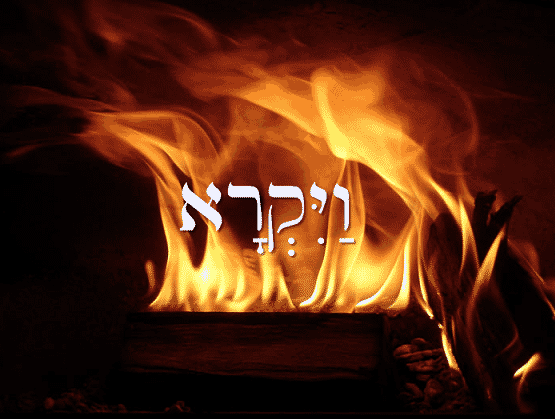
This week’s parasha, Vayikra, begins with Hashem calling out to Moshe Rabbenu, His voice emanating from His Shechina, which rested in the holiest part of the Mishkan:
| And He called to Moshe, and the Lord spoke to him from the Tent of Meeting, saying, |
According to our Rabbis, this ‘calling’ of Moshe was significant, because when Hashem “calls” to someone, it is a sign of His love for that person.In fact, this was not a one-time event, but rather one example of many:
This calling is mentioned here because it was the first [of many].
-Ramban
How does Hashem calling someone shows His love?
Let’s take a look at a Midrash:
This can be compared to a king who commanded his servant to build him a palace. On every wall, panel and beam the servant put up, he wrote the name of the king. When the palace was completed and the king entered, he looked and saw that his servant had written his name everywhere. Said the king: ‘My servant has given me such great honor- and I am inside while he is outside?! Call for him that he should enter!’ -So too, when Moshe wrote the Torah, for every part of the Mishkan completed he wrote:
‘just as Hashem had commanded Moshe’.
Hashem said: ‘Moshe gave me such great honor!’ -Immediately, he called to Moshe that he should enter the Holy of Holies…
-Midrash
-Interesting, but what does it mean?
- Why did the servant write the king’s name all over the palace?
- Why did the king only comment once he had entered the palace?
- Even if the servant did honor him, why did the king think it unfair for him to be left out of the palace?
- The palace was still meant for the king to live in alone, separate from his subjects; couldn’t he have rewarded the servant in a different way?
- In what way was Moshe writing ‘just as Hashem had commanded Moshe’ an honor of Hashem?
Picture a servant who admires and respects his king very much. You can imagine how honored he feels if he is given the command to build the palace. Understandably, as this dedicated servant goes about his work, his thoughts are occupied with the king, and he feels a deep sense of privilege and fulfillment in his work. As he finishes building, he begins to decorate the palace- not because he had been asked to do so, but because he wanted to. More than just decorating, he wanted to praise the king, to honor him. Because he valued the king so much, no amount of words could do justice in the servant’s eyes. Instead, he wrote the king’s name- for with that name, in that reference, wouldn’t all praise be self-evident? The mention of his name, then, would clearly be the greatest praise- as if to say that nothing else needed to be said, as the king’s qualities were both obvious and beyond words.
The king enters and sees and understands-because this writing was only on the inside of the walls. It wasn’t done for others to see and surmise that this servant must be faithful- it was rather a natural outgrowth of deep-seated feelings- and intended for himself and the king. The king understands: true, the palace’s function is to strengthen the honor of the king, to differentiate between royalty and the commoners. But for this servant, this function is not necessary, for his every action is clearly with the king’s honor in mind. Such a servant has already learned the lesson of the king’s elevated status, and so there is no reason to keep him out! Moreover, since this servant lives for the king’s honor, what better reward could there be for his faithfulness than to show him that honor? The greatest reward such a person can receive is to be brought inside, to see the king’s honor up close, and to be given more opportunities to serve him.
-So it was with Moshe. He wasn’t told to mention that he had followed Hashem’s command in facilitating the building of the Mishkan and its vessels- yet he did so in his desire to honor Hashem to the best of his ability. He did so by reminding the world that the entire structure came about for one reason alone: because Hashem had willed it. And his, Moshe’s involvement, was simply that of a servant who humbly wished to serve his Master. And within this expression of commitment, he mentioned Hashem’s name:
‘just as Hashem had commanded Moshe’.
-The very mention of Hashem’s name was really all we needed to hear; everything else was already understood, and nothing more needed to be said. In so doing, then, Moshe fulfilled Hashem’s initial command in the highest sense:
| “Speak to B’nie Israel, and have them take for Me an offering; from every person whose heart inspires him to generosity, you shall take My offering.” |
and have them take for Me:’For My Name’.
-Rashi-Moshe was the true Servant of God, and Hashem loved him and called to him in recognition of his devotion.
Let’s try to continue this topic next week.
Have a great Shabbat!
Elli Schwarcz is an alumnus of the Toras Moshe, Ner Israel, and Carteret Yeshivos, and has been involved in Jewish outreach for almost 15 years. He is a Hebrew School and English Language Arts teacher, and has a Master’s Degree in Counseling from Johns Hopkins University. Of all his pursuits, Elli most enjoys teaching high-level Jewish thought and Talmud to teenage boys, exposing them to the beauty and wisdom of their heritage while highlighting their own ability to engage in advanced Torah learning. Elli lives in Lakewood, New Jersey, with his wife and children.